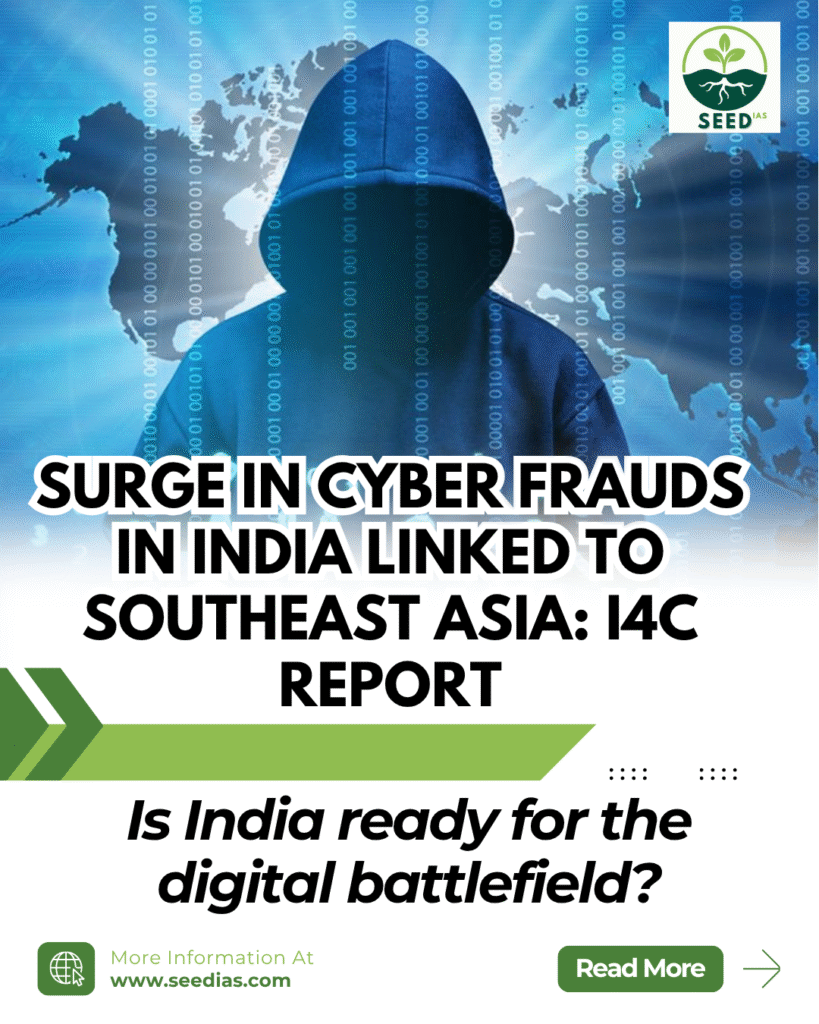Why in NEWS
The Indian Cyber Crime Coordination Centre (I4C) under the Ministry of Home Affairs reported a sharp increase in financial cyber frauds in 2025, many originating from Southeast Asian countries like Cambodia and Myanmar.
Key Terms/Concepts
| Term | Description |
|---|---|
| I4C | Indian Cyber Crime Coordination Centre under MHA, launched in 2020 |
| Digital Arrest Scam | Fake officials extort money under threat of arrest |
| BEC (Business Email Compromise) | Hackers impersonate legitimate entities to steal money |
| Phishing | Fake emails trick users into giving sensitive info |
| Chakshu | DoT tool to report scam calls/messages via Sanchar Saathi portal |
What the News Says
| Key Area | Highlights |
|---|---|
| Financial Losses | ₹1,000 crore/month lost in H1 2025; projected ₹1.2 lakh crore loss in 2025 (0.7% of GDP) |
| Origin of Fraud | 50%+ scams from Cambodia, Laos, Myanmar, Vietnam, Thailand—run from high-security scam centres |
| Modus Operandi | Fake job offers, human trafficking, SIM frauds, ghost PoS agents, immigration loopholes |
| Enforcement Weakness | Poor digital KYC, illegal SIM issuance, weak cross-border tracking |
Types of Cyber Frauds
| Type | Description |
|---|---|
| Digital Arrests | Fake officials threaten legal action to extort money |
| Task-based Job Scams | Victims lured with work-from-home jobs requiring initial payments |
| Phishing & Malware | Trick users into revealing info or infect systems |
| Ransomware | Lock data, demand payment for decryption |
| Dating Frauds | Exploit personal relationships for financial access |
| BEC & Cyber Spying | Hacked emails or surveillance of sensitive networks |
| ATM/PoS Skimming | Stealing card details through physical or digital means |
Major Cyber Fraud Cases
| Case | Summary |
|---|---|
| Aadhaar Breach (2018) | Data of 1.1 billion citizens exposed, including sensitive financial info |
| Canara Bank ATM Attack | Skimming led to ₹20 lakh theft across 300 debit cards |
| Pegasus Spyware | Surveillance software targeting 300 Indian phone users |
Key Cybersecurity Initiatives
| Initiative | Description |
|---|---|
| CERT-In | National response team for cybersecurity incidents |
| Cyber Swachhta Kendra | Botnet cleaning and malware analysis |
| Digital Intelligence Platform | Tracks and blocks cyber fraud in real-time |
| Chakshu (Sanchar Saathi) | Allows citizens to report suspicious calls/SMS on KYC or bank info |
| Bharat National Cybersecurity Exercise | Capacity-building simulation exercise by Indian government |
| IT Act, 2000 & DPDP Act, 2023 | Legal frameworks for data protection and cybercrime regulation |
Global Efforts on Cybersecurity
| Platform/Convention | Key Feature |
|---|---|
| Budapest Convention | First global treaty on cybercrime; India not a signatory |
| UN OEWG & GGE | UN platforms for building global cyber norms and cooperation |
| Internet Governance Forum (IGF) | UN-backed multi-stakeholder dialogue on internet governance |
Measures Needed to Strengthen Cybersecurity in India
| Focus Area | Action Required |
|---|---|
| AI & Infra | Deploy AI for early detection, ransomware analysis, and cyber forensics |
| Awareness Campaigns | Cyber literacy in regional languages; school-level curriculum inclusion |
| Institutional Reforms | District-level cyber units, regular audits in critical sectors |
| Banking & Business Safeguards | Stronger KYC, 2FA, transaction tracking, IP alerts, cryptocurrency monitoring |
| Personal Hygiene | Educate public on passwords, avoiding shady links, safe browsing practices |
In a Nutshell
Mnemonic: SCAM ALERT
Southeast Asia Origin
Chinese-controlled scam hubs
AI needed in detection
Malware, Phishing, Ransomware rising
Awareness key to prevention
Legal gaps remain
Enforcement coordination needed
Report via portals (I4C, Chakshu)
Trillion-rupee losses expected
Prelims Questions
- Which of the following is not a feature of the Chakshu tool launched by DoT?
a) Reporting scam calls
b) Deleting fraudulent SIMs directly
c) Reporting KYC expiry frauds
d) Tracking WhatsApp phishing messages - Pegasus spyware, which affected Indian users, is mainly associated with:
a) Ransomware attacks
b) Data skimming
c) State-sponsored cyber surveillance
d) Online job frauds - The Budapest Convention on Cybercrime is:
a) Signed and ratified by India
b) An African Union initiative
c) A UN resolution passed in 2022
d) The first international treaty to combat cybercrime
Mains Questions
- (GS3 – Internal Security)
Discuss the major challenges posed by cross-border financial cyber frauds to India’s internal security. What measures can be adopted to address them? 10 Marks - (GS3 – Science & Tech)
“Legal measures alone are not sufficient to combat cyber fraud in India.” Discuss in the context of recent I4C findings. 10 Marks
Prelims Answer Key
| Q.No | Answer | Explanation |
|---|---|---|
| 1 | b | Chakshu helps report frauds; it doesn’t directly delete SIMs |
| 2 | c | Pegasus is used for surveillance, not ransomware or fraud |
| 3 | d | Budapest Convention is the first global cybercrime treaty; India is not part |














